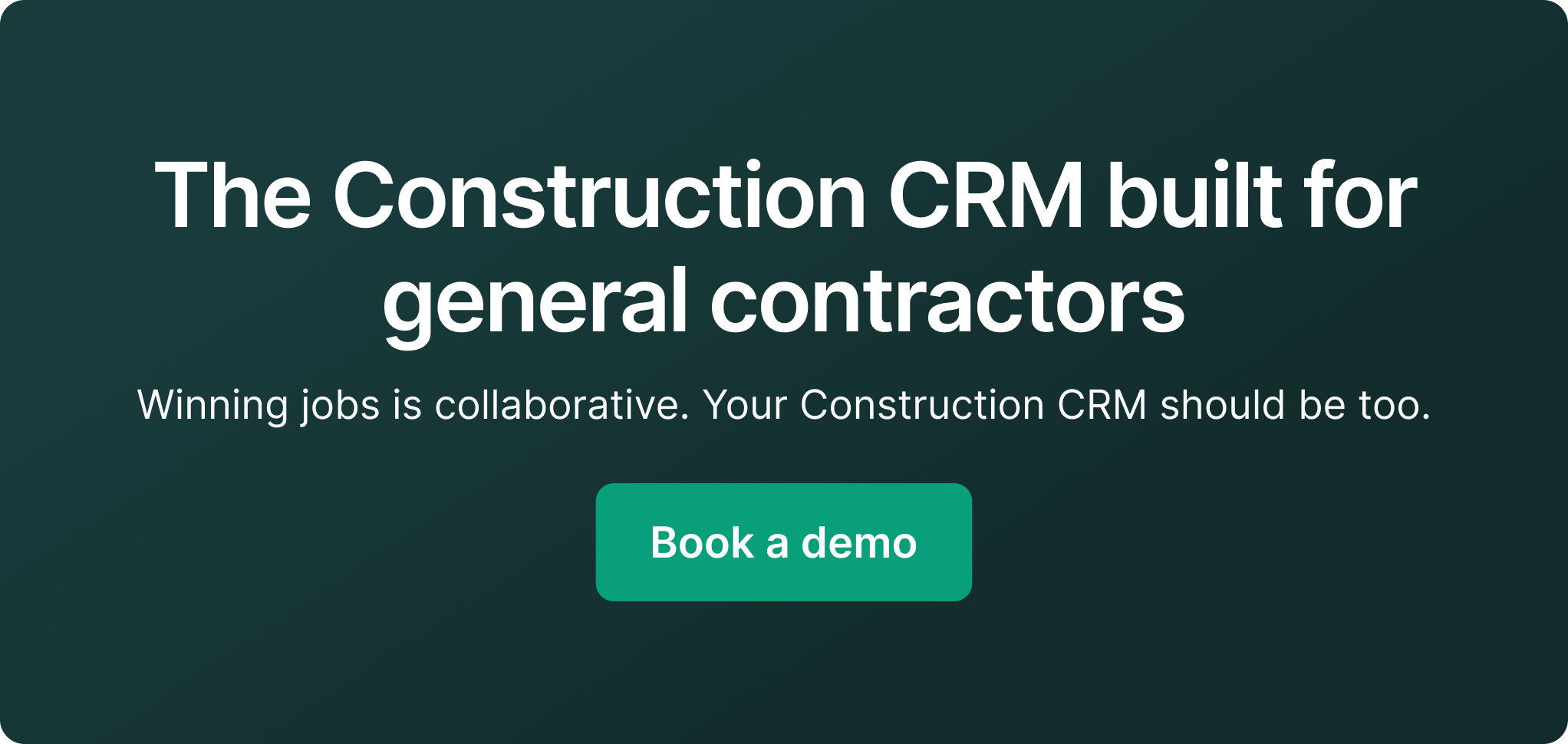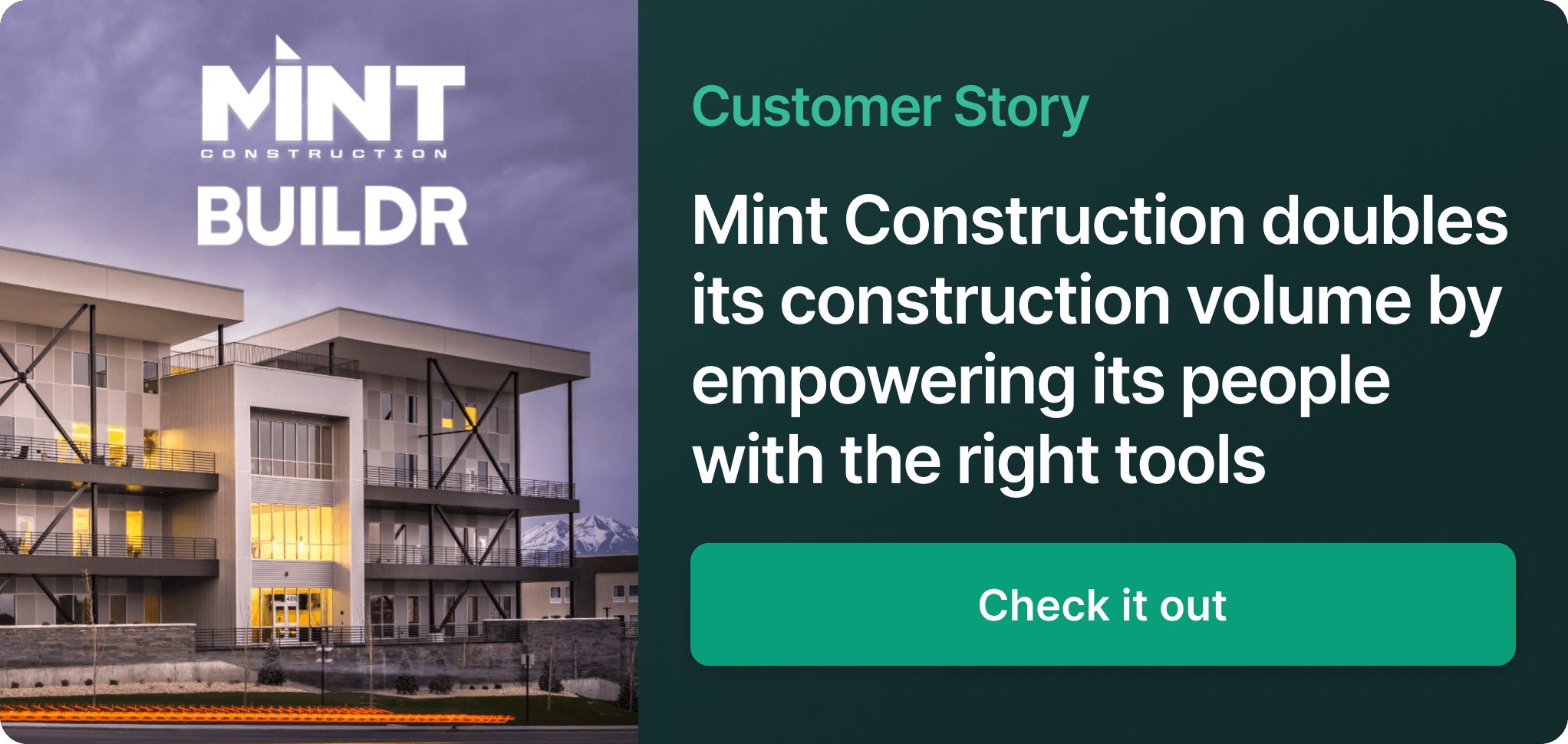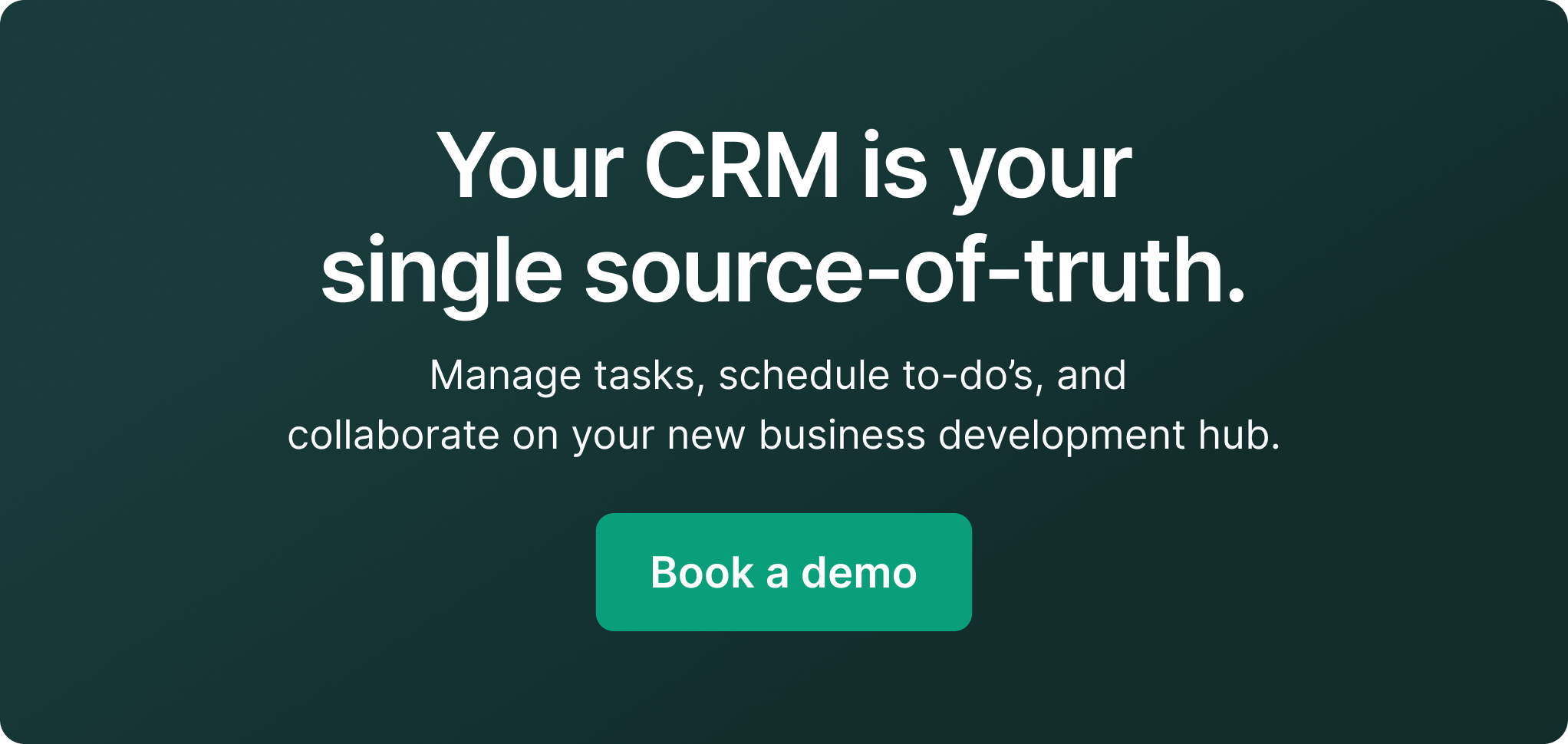Construction CRM: The Comprehensive Guide
What CRM is, why it’s vital for construction, and how using CRM effectively is guaranteed to help your business

Edward Gonzalez
Founder

Introduction
The construction industry is built on relationships—often forged over decades, if not generations. In a world where 70% or more of a general contractor’s business can come from repeat customers, nurturing those relationships is absolutely critical. That’s where a Customer Relationship Management (CRM) system comes in. But not all CRMs are created equal.
Generic, or “horizontal” CRMs have exploded in popularity across many industries. Construction, however, has historically lagged behind in CRM adoption. This article explores why construction-specific CRM matters, how it differs from a one-size-fits-all solution, and the features you should look for when adopting a CRM that will put you in a prime position to grow your business.
What is CRM (and Why Does Construction Need It)?
Construction CRM is a construction-specific software solution that helps organizations manage client relationships, streamline task scheduling, meet deadlines, and capture vital historical data. It serves as the single source-of-truth, ensuring seamless collaboration and alignment across your teams.
Why is a CRM so crucial for construction?
• Complex relationships: GCs have to communicate with owners, architects, design teams, lenders, owner’s reps, trade partners, and engineers, alongside its own internal teams. And that’s before a project even begins. Tracking historical records and updates across each stakeholder is essential.
• Single source-of-truth: Rather than constantly juggling spreadsheets, emails, and phone calls, a CRM centralizes data about leads, clients, tasks, revenue, estimates, and projects in a single location.
• Data-driven decision-making: GCs need to know which project types are most profitable, which bids they tend to win or lose, when the last time they had a touchpoint with x client, and how accurate their financial forecasting is—all of which a CRM can easily track.
In short, a CRM lets you systematize and scale your relationship-building efforts, so every client feels like they’re your only client—even as your book of business grows.
Construction CRM vs. Generic “Horizontal” CRM
The key differentiator is industry-specific functionality. While a horizontal CRM might work for industries like retail, finance, tech, or media, construction brings a distinct set of challenges. You’re dealing with:
• Estimate Histories & Complex Financial Forecasting
• Multiple Revenue Streams (Public vs. Private, Commercial vs. Residential)
• Role-Based Permissions (for estimators, preconstruction, marketing, leadership, and business development teams)
• Bid Tracking & Proposal Workflows
• Scenario Planning (e.g., “won jobs” vs. “won + potential jobs”)
Generic CRMs typically require heavy customization to handle these aspects. In contrast, a construction CRM is designed to integrate easily with your existing project workflows, helping you get up and running faster, reduce errors, and see immediate ROI.
General contractors will often hire third-party vendors to customize a generic CRM to their complex needs, which negates any initial low-cost appeal. This extra layer of cost and complexity not only slows down adoption and dilutes the user experience, but it also undercuts the platform’s overall return on investment.
Don’t be fooled by generic software that calls itself “simple.” Construction is a complex, project-based industry, and you need a CRM built by experts who understand it. You shouldn’t have to waste time wrestling with a one-size-fits-all platform that never truly fits—choose a solution that meets your specific workflows from day one.
Believe it or not, the biggest competitor of a construction CRM isn’t a generic CRM but spreadsheets. To learn more about how a construction CRM compares to spreadsheets, check out our blog CRM vs. Spreadsheets: The Benefits of Upgrading for General Contractors. Spoiler: it’s a first-round knockout.
Benefits of a Construction-Specific CRM
What’s the first thing you do when you hear about a lead? Ten GCs will tell you ten different answers. “If it’s not recorded in your CRM, it didn’t happen,” is a notion many live by. While a construction CRM provides a much needed standardized system for recording crucial data, it also helps instill a smarter preconstruction process. Here are a few reasons why:
1. Seamless preconstruction integration
Your CRM should slot into your preconstruction workflow without a hitch, enabling estimators, business development, leadership, marketing, and precon teams to collaborate on a single platform. This drastically cuts down on duplicate data entry and missed follow-ups.
2. Automated tasks & reminders
Construction timelines can be long, and tasks can slip through the cracks if not monitored. A specialized CRM automatically prompts you on next steps (i.e., follow-up post-bid, re-estimation cycles, or collecting signatures before a scheduled start date).
3. Data-driven analytics
With every touchpoint, estimate, and bid recorded, you gain powerful insights into your pipeline. You can see which types of projects bring the highest ROI and forecast revenue by quarter or year, factoring in won jobs and probable future wins.
4. Interdepartmental collaboration
In many GCs, siloed departments (e.g., operations and business development) cause breakdowns in communication. A single, unified system ensures real-time information sharing, so your precon, estimating, and BD teams are always on the same page.
5. Faster ROI
Because a construction-specific CRM is designed for your industry’s unique needs, there’s less customization required. This means faster onboarding, quicker team adoption, and a more immediate return on investment.
To hear how Mint Construction saw immediate ROI with a suitable construction CRM, check out our case study, Mint Construction doubles its construction volume by empowering its people with the right tools.
Essential Features to Look For
When evaluating CRMs, keep an eye out for:
1. Bid & project tracking
Centralize all bids, proposals, and project details—complete with statuses, deadlines, and assigned team members.
2. Robust forecasting tools
Your CRM should forecast future opportunities based on historical data, factoring in variables like bid history, project types, and current vs. potential jobs.
3. Integrations with existing software
Look for plug-and-play integrations with other platforms (i.e., Procore, Microsoft 365) so data flows seamlessly across systems. You’ll want calls and emails to be auto-recorded within your CRM
4. Mobile access
Construction teams are constantly on the move. A CRM should offer an easy-to-use mobile app that sales reps, estimators, or field staff can update from any location. Check out our blog on Buildr’s mobile construction CRM experience to learn more.
5. Role-based permissions & collaboration
Preconstruction consists of many stakeholders. Make sure the CRM supports different access levels to the right people (i.e., leadership sees financial forecasting, estimators handle cost details, BD sees client contact data).
Check out our blog The 7 Essential Features of Construction CRM for a more detailed explanation of what to look for when choosing your platform.
Implementation & Adoption: Tips for General Contractors
• Start small: Identify a pilot group—like the BD team or a single business unit—to test features and gather feedback.
• Train & support: Even user-friendly CRMs require onboarding. Host training sessions and create quick-reference guides to ensure your staff feels confident. Buildr offers easy data importing, white-glove onboarding, and unlimited in-house support from construction experts. Shout out to our industry-leading sub-10 minute response times!
• Measure results: Track baseline metrics (e.g., bid-win ratio, time spent on follow-up). Compare them after CRM adoption to demonstrate ROI. For return on investment strategies, check out our blog CRM in Construction: Maximizing the ROI of your CRM as a general contractor. ROI indicators include improved bid efficiency, higher win rate, reduced client churn, and better data for strategic planning.
Looking Ahead: The Future of Construction CRM
More GCs are seeing the light when it comes to CRM adoption, especially as new competitors are embracing technology and improving their preconstruction process to secure bigger bids and peel away your best customers. Over the next 5–10 years, construction-specific CRMs will likely become as standard as project management or accounting software. Early adopters gain a competitive edge and set themselves up for long-term growth.
Final Thoughts
A construction-specific CRM offers the best of both worlds: proven CRM principles plus industry-focused tools and workflows that speak the language of general contractors. It unifies your preconstruction efforts into one streamlined hub. And most importantly, it does so with minimal customization, faster implementation, and an easier learning curve compared to most horizontal CRMs.
The bottom line: if you’re a GC serious about improving efficiency, growing your client base, and harnessing data for strategic decisions, a specialized CRM is no longer a “nice to have”—it’s the new standard.
Construction CRM for General Contractors - FAQ
1. Why do general contractors need a construction-specific CRM?
Construction is complicated and your time is limited. A CRM that comes tailored to the GC’s workflow out-of-the-box meets you where you’re at so that you don’t have to waste time and energy bending generic software to your needs.
A construction CRM is valuable in that it allows builders to manage leads, track projects, and maintain a full client database in a centralized place. Best of all, your construction CRM acts as a single source-of-truth for your leadership, estimating, business development, and preconstruction teams, unlocking full visibility of your sales pipeline, existing client relationships, and upcoming opportunities.
2. How does a construction CRM differ from a generic or “horizontal” CRM?
The key differentiator is industry-specific functionality. While generic (“horizontal”) CRMs often need extensive customization to accommodate construction workflows—such as detailed project tracking, estimate histories, role-based access, and scenario-based financial forecasting that factors in both won and potential jobs—a construction-focused CRM delivers these capabilities right out of the box.
3. What are the must-have features for a construction CRM?
• Collaboration: Keep estimators, BD, and precon teams in sync. Unlimited seats, like Buildr offers, is ideal.
• Bid/opportunity tracking: Track all bids, proposals, and follow-up tasks.
• Project pipeline forecasting: Predict future business volume and revenue.
• Task automation & reminders: Automate repetitive tasks so nothing falls through the cracks.
• Mobile access: Let field teams update info on the go.
• Go/No Go: Fine-tune the criteria that defines best-fit jobs as they relate to your goals to better evaluate time spent.
4. Will a CRM integrate with my existing construction software (i.e., Procore, BIM, ERP)?
Most modern CRMs for construction either have native integrations or flexible APIs to connect with the most popular construction software solutions. Always verify the specific integrations (i.e., Procore, Autodesk, Sage) and check if custom integrations can be set up if needed.
5. Does Procore have a CRM?
No. But we have fantastic news—Buildr has a CRM that integrates with Procore.
6. Is a construction CRM only for large general contractors or can smaller GCs benefit as well?
Any size GC can benefit. Smaller GCs often realize immediate benefits because they can do more with less people and they’re more agile than their larger rivals. Larger GCs can unify processes across multiple departments and offices. The key is finding a CRM solution that scales with your business. Buildr’s client base ranges from around $5mm to over $1 billion in annual construction volume.
7. How quickly can we implement a construction CRM?
Implementation timelines vary depending on the CRM platform, the complexity of your processes, and the size of your team. Some solutions can go live within days or weeks if you’re importing existing customer data and setting up standard workflows. Industry-specific CRMs often require less customization than generic CRMs, speeding up adoption. Buildr’s free onboarding gets your teams up to speed in a few weeks.
8. How do we measure ROI from a construction CRM?
Some common ROI indicators include:
• Time saved on manual data entry, follow-up, and trying to find that one spreadsheet you swore was in that one folder.
• Increased bid-to-win ratio due to better pipeline management.
• Reduced client churn thanks to improved relationship tracking.
• Faster decision-making using real-time project and revenue insights.
Track these metrics before and after implementation to accurately quantify your results.
9. Can a CRM help us improve repeat business with existing clients?
Yes. A CRM helps ensure consistent communication with key accounts, tracks historical project data for future bids, and automates reminders for relationship-building tasks. Because repeat business often makes up a large share of a GC’s revenue (70-90% according to Buildr customers), nurturing these relationships is critical.
10. Can a CRM help us win more jobs?
Yes, and better jobs too. That’s what increased speed, better collaboration, and learnings from historical data can do for you. If you’d like to hear from them firsthand, we can link you up with our customers.
11. How does pricing typically work for construction CRMs?
Pricing models range from per-user licensing to flat monthly subscriptions to annualized construction volume. Some CRMs bundle advanced features (like workforce planning or custom integrations) into higher-tier plans. Always factor in potential onboarding, training, or custom integration costs when budgeting. Buildr offers flexible pricing based on annualized construction volume.
12. Does a construction CRM replace or integrate with existing project management systems?
A CRM is primarily used for managing client relationships, tracking leads, and forecasting revenue. It doesn’t replace project management tools for scheduling, budgeting, or on-site tasks. However, most construction CRMs integrate with PM systems so your preconstruction and ongoing project details remain synchronized.
13. How do I get my team to adopt a new CRM?
• Choose a user-friendly solution that aligns with your existing workflows.
• Offer proper training and onboarding to minimize resistance.
• Highlight “quick wins” like automated reminders, a company directory, or simplified estimate history tracking.
• Leadership support is crucial—when managers use it and share results, the rest of the team follows.
14. Okay, okay, I get it. How do I learn more about Buildr?
You can check out our preconstruction platform product page, read our blogs, or talk to a product expert by filling out our demo request form.


